Moving to Georgia: THE Complete Relocation Guide and Checklist
- Local Editor:Local Editor: Brennan Dolan
Published: Jul 21, 2025
- Category: Moving , City Living Guide
Thinking about making the move to Georgia? The Peach State is a great selection. The people are friendly, the sweet tea is cold, and the living is good. As a life-long Georgia resident I can tell you, this state has a lot to offer. Whether you’re drawn by the booming job market, top-tier schools, or the promise of warm winters and lush summers, you’ll find plenty to love here.
This comprehensive Georgia moving guide is your one-stop shop for everything you need to know before you relocate—from the cost of living breakdown and job market analysis to the best places to live and how to settle in. Whether you’re dreaming of Atlanta’s metropolitan energy, Savannah’s historic charm, Augusta’s golf heritage, or the quiet beauty of the North Georgia mountains, this article will help you make an informed decision about your Georgia relocation.
Pros and Cons of Living in Georgia
Let’s explore the pros and cons of living in Georgia, including the best cities for young professionals, families, and retirees. We’ll provide insights to help you make the best decision for yourself, whether you’re drawn by Georgia’s affordable cost of living, its thriving job market, or its scenic landscapes…
Table of Contents:
- Why Choose Georgia for Your Next Move?
- 1. What Is It Really Like to Live in Georgia?
- 2. Cost of Living & Affordability in Georgia
- 3. Jobs, Economy, and Career Opportunities
- 4. Education Excellence in Georgia
- 5. Georgia Tax Structure
- 6. Best Places to Live in Georgia
- 7. Planning Your Georgia Move: Step-by-Step Timeline
- 8. Settling In: Practical Essentials
- 9. Georgia’s Unique Rules and Requirements
- 10. Financial Planning and Budget Adjustment
- Insider Tips from a Georgia Local
- Frequently Asked Questions About Moving to Georgia
Why Choose Georgia for Your Next Move?
Georgia consistently ranks among America’s top relocation destination. On an annual basis thousands of new residents who are drawn by a unique combination of Southern charm, economic opportunity, and exceptional quality of life. The Peach State offers an unbeatable lifestyle where you can advance your career in thriving industries while enjoying year-round mild weather, rich cultural heritage, and genuine Southern hospitality.
What makes Georgia irresistible to relocators is its business-friendly environment, diverse job market, affordable cost of living, and strategic location in the Southeast providing easy access to major East Coast markets. From the tech boom in Atlanta’s Silicon Valley of the South to the manufacturing corridors stretching across rural Georgia, the state provides career opportunities while maintaining that authentic Southern culture and strong sense of community.
Mission Table: How This Guide Helps You Relocate to Georgia
| Mission Area | How This Guide Helps You |
| Research & Planning | Gives you the inside scoop on Georgia cities, metro Atlanta neighborhoods, living costs, and what to expect when you move. |
| Financial Preparedness | Helps you budget for Georgia cost of living and get your finances ready for Peach State living. |
| Legal & Documentation | Walks you through Georgia residency requirements, vehicle registration, and essential paperwork you need. |
| Community Integration | Tips for making friends, finding local resources, and feeling at home in your new Georgia neighborhood. |
| Ongoing Support | Answers your relocation questions and provides comprehensive checklists for every step of your Georgia move. |
10 Best Places to Live in Georgia in 2025
If you’re looking for some good old-fashioned Southern hospitality, look no further than Georgia. The Peach State has plenty of small-town charm to welcome you in, as well as big-city development, artistic expression and innovation...1. What Is It Really Like to Live in Georgia?

A. Georgia Culture & Lifestyle
Living in Georgia means embracing a unique blend of Southern hospitality, rich historical heritage, and modern innovation that defines the New South experience. The state is famous for its genuinely friendly, welcoming attitude—whether you’re in bustling Atlanta, historic Savannah, or a small town in the Blue Ridge Mountains, you’ll find neighbors who look out for each other and maintain strong community bonds.
Georgia’s culture reflects diverse influences from Native American heritage, African American traditions, European settlers, and growing Asian communities, creating a rich cultural tapestry. You’ll discover everything from antebellum architecture and Civil Rights landmarks to vibrant arts districts and world-class universities. The state’s motto, “Wisdom, Justice, and Moderation,” reflects its resident’s values and commitment to progress while honoring tradition.
B. Food Scene: Southern Comfort and Global Flavors
Georgia’s culinary scene offers a rare fusion of authentic Southern comfort food and international cuisine that reflects the diverse population. Local Georgia favorites include fresh Georgia peaches (the official state fruit), juicy and sweet during summer harvest season. Fried chicken and buttermilk biscuits represent classic Southern staples, best enjoyed with sides of collard greens and mac and cheese. Shrimp and grits showcase the coastal heritage, especially popular in Savannah’s historic district.
Georgia barbecue features slow-smoked pork, ribs, and brisket served with tangy regional sauces, while peach cobbler provides the perfect dessert after any Southern meal. You’ll also find exceptional international cuisine throughout Georgia cities, especially in Atlanta’s diverse food halls and Savannah’s eclectic downtown eateries.
Don’t miss trying boiled peanuts—a uniquely Southern snack—or a slice of authentic Georgia pecan pie, both considered rites of passage for new Georgia residents.
3 Most Affordable and Safe Places to Live in Georgia
Each town maintains a cost-of-living index below the national average—ranging from 80% to 90%—further enhancing their appeal for family budgets. These communities exemplify Georgia's reputation for offering an exceptional quality of life without compromising financial security...C. Festivals, Music, and Arts
Georgia’s arts and culture scene thrives year-round, with Atlanta boasting world-class museums, theaters, and music venues, while Savannah enchants visitors with historic architecture and lively arts festivals throughout the coastal region.
Major cultural highlights include the National Black Arts Festival held in Atlanta, one of America’s largest celebrations of African American art and culture. The renowned Savannah Music Festival features world-class jazz, classical, and folk music performances. The Georgia Renaissance Festival provides family-friendly entertainment every spring in Fairburn, while the Atlanta Film Festival showcases independent films from around the world.
Beyond festivals, Georgia cities offer abundant cultural amenities including prestigious museums, professional theater companies, and contemporary art galleries. The High Museum of Art in Atlanta ranks among the Southeast’s premier art destinations, while Clark Atlanta University houses notable African American art collections that celebrate the city’s cultural heritage.
D. Outdoor Life & Recreation
Georgia offers incredible outdoor recreation opportunities across diverse landscapes from the Appalachian Mountains to the Atlantic coast. The famous Appalachian Trail begins in North Georgia’s mountains, while countless state parks and hiking trails provide outdoor adventures throughout the state.
Fishing and boating enthusiasts enjoy crystal-clear mountain lakes like Lake Lanier and pristine rivers including the Chattahoochee River system. Georgia’s Golden Isles and Tybee Island offer beautiful sandy beaches with warm Atlantic Ocean waters perfect for swimming, surfing, and beach activities.
Wildlife watching provides encounters with white-tailed deer, wild turkeys, and even occasional alligator sightings in coastal marshes and wetlands throughout South Georgia.
E. Weather & Climate
Georgia’s climate varies by region but generally features mild winters and warm, humid summers that define the Southern experience. Summers bring high temperatures with common afternoon thunderstorms that provide refreshing relief. Winters remain mild with occasional cold snaps and rare snowfall, especially in North Georgia mountains.
Spring and fall seasons are brief but spectacular, featuring crisp air and brilliant foliage colors throughout the state’s diverse landscapes. Georgia receives abundant sunshine year-round, providing endless opportunities for outdoor activities and recreational pursuits.
Pros and Cons of Living in Georgia
Let’s explore the pros and cons of living in Georgia, including the best cities for young professionals, families, and retirees. We’ll provide insights to help you make the best decision for yourself, whether you’re drawn by Georgia’s affordable cost of living, its thriving job market, or its scenic landscapes…
2. Cost of Living & Affordability in Georgia
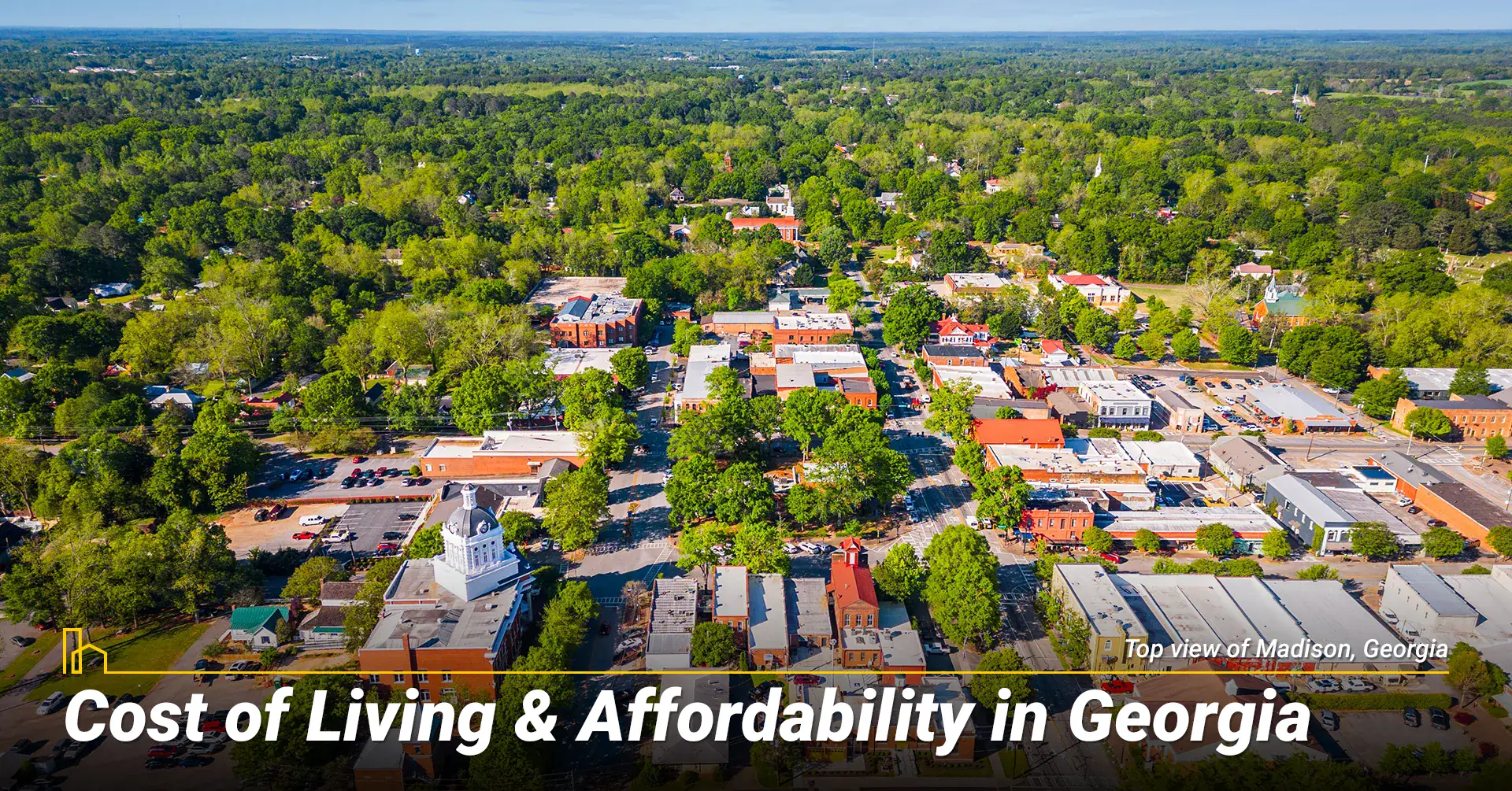
Georgia’s cost of living runs approximately 5% lower than the national average, making it one of America’s most affordable states for families and professionals seeking value without sacrificing quality of life.
A. Georgia Housing Market Overview
| City/Region | Median Home Price | 1BR Rent | 2BR Rent | 3BR Rent |
| Atlanta Metro | $357,677 | $1,112 | $1,086 | $1,196 |
| Augusta Metro | $206,172 | $900 | $950 | $1,050 |
| Savannah Metro | $288,109 | $1,000 | $1,100 | $1,200 |
| Columbus Metro | $166,902 | $850 | $900 | $1,000 |
| Macon Metro | $159,054 | $800 | $850 | $950 |
Notes: Rent values represent median monthly rates for 2025. Home prices are current as of early 2025 and vary by specific neighborhood. Average rent for all bedrooms and property types in Georgia is approximately $1,850 as of 2025, including luxury and short-term rentals, though typical family rentals are significantly lower.
B. Utilities and Daily Living Expenses
Georgia utilities remain generally affordable, though air conditioning costs increase during humid summer months. Monthly expenses typically include electricity ($134), natural gas ($118), water ($28), and internet ($108), totaling approximately $411 for a typical home.
C. Groceries and Transportation Costs
Grocery costs align with national averages, with monthly food expenses ranging $308–$438 per person depending on location and shopping preferences. Transportation costs remain reasonable with gas prices typically $3.00–$3.50 per gallon. Public transit operates in Atlanta and Savannah, but most Georgia residents rely on personal vehicles for daily transportation.
3 Most Affordable and Safe Places to Raise a Family in Georgia
Georgia has earned its reputation as an ideal destination for families seeking safe, affordable, and welcoming communities. Throughout the state, numerous towns combine economic accessibility with strong community values, creating perfect environments for raising children…
3. Jobs, Economy, and Career Opportunities

Georgia’s economy remains strong and diverse, with job growth outpacing national averages across multiple sectors. The state recorded 266,000 job openings in March 2025, with a 5.1% job openings rate exceeding national benchmarks, reflecting continued economic expansion and opportunity.
A. Major Industries and Employment Sectors
Georgia offers excellent career opportunities across diverse industries. Advanced Manufacturing leads with $59.5 billion output and nearly 289,000 production workers, featuring machinery, electrical equipment, and fabricated metals production. The Automotive sector includes major employers like Kia Motors, Toyo Tire, and Blue Bird Corporation manufacturing throughout the state.
Aerospace and Defense companies including Lockheed Martin and Gulfstream Aerospace maintain significant Georgia operations. Food Processing giants like The Coca-Cola Company, Tyson Foods, and various agricultural processors anchor the state’s economy. Life Sciences continue growing rapidly with WellStar Health System, Tanner Medical System, and other healthcare organizations expanding statewide.
Film and Entertainment have transformed Georgia into “Hollywood of the South,” generating $4 billion in direct spending during 2021 and creating thousands of jobs in production, post-production, and related services.
B. Metropolitan Job Markets and Economic Centers
| Metro Area | Key Industries | Notable Major Employers |
| Atlanta Metro | Technology, finance, healthcare, logistics, film | Delta Air Lines, Coca-Cola, Home Depot, UPS |
| Savannah Metro | Logistics, manufacturing, tourism, aerospace | Gulfstream Aerospace, Port of Savannah, tourism industry |
| Augusta Metro | Healthcare, military, manufacturing, cybersecurity | Augusta University, Fort Gordon, various manufacturers |
| Columbus Metro | Manufacturing, military, healthcare, insurance | Fort Benning, TSYS, AFLAC, regional medical centers |
Atlanta serves as Georgia’s economic engine and the Southeast’s business capital, but excellent opportunities exist in healthcare, manufacturing, and logistics throughout the state. Remote work continues growing, supported by strong internet infrastructure and exceptional quality of life.
The 22 Affordable Things to do in Dahlonega, Georgia
The advantage of being such a small city is that it can sustain a very affordable cost of living — and vacationing, too. Low-cost attractions abound in Lumpkin County; locals and vacationers will find no shortage of things to do...4. Education Excellence in Georgia

Georgia’s education system combines strong public schools with prestigious universities, creating excellent opportunities for families and students. The state ranks first nationally in connecting K-12 education with early learning, higher education, and workforce development.
A. Public School System Performance
Georgia offers universal Pre-K programs and maintains school districts consistently ranked among America’s best. Recent data shows approximately 85% of high school seniors graduate on time, with continued improvement in student achievement across all demographics and regions.
B. Higher Education Institutions
Georgia hosts some of America’s top universities including the University of Georgia in Athens (flagship public research university), Georgia Institute of Technology in Atlanta (world-renowned for engineering and technology), Emory University in Atlanta (prestigious private university focusing on medicine and law), Savannah College of Art and Design (leading art and design institution), and Georgia State University in Atlanta (large public university with diverse student body).
Numerous community colleges and technical schools throughout the state provide affordable pathways to higher education and career training programs.
15 Things People Usually Forget When Moving
Whether or not you decide to hire a professional moving company, this guide includes everything you need for completing your move. It’s always best to have this list handy so you can check off each task and know that you’re on top of everything…
5. Georgia Tax Structure
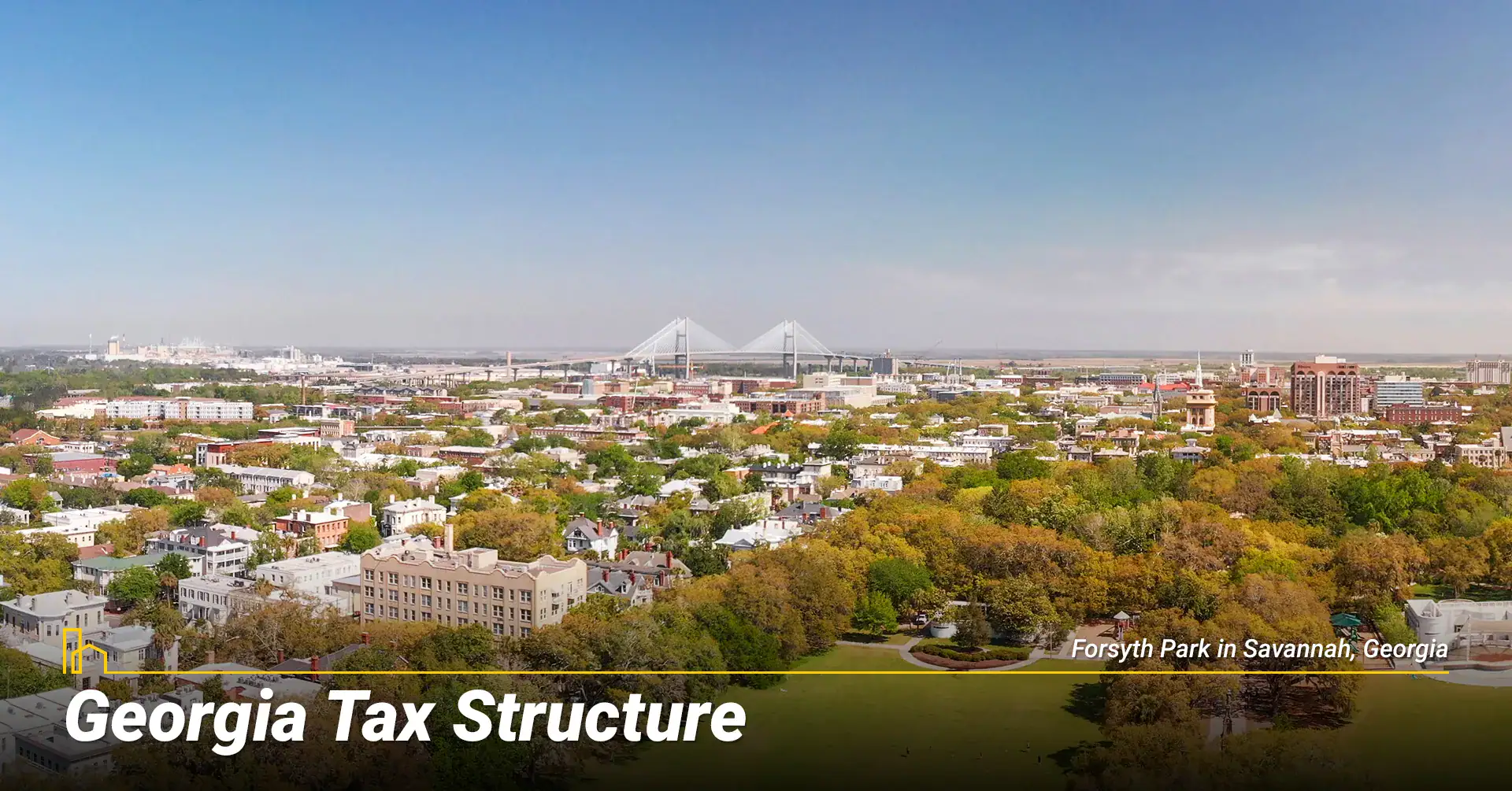
Georgia maintains a straightforward, business-friendly tax structure. The state levies a 5.39% flat income tax rate as of 2024. Sales tax includes a 4% state rate plus local add-ons, with average combined rates ranging 7%–9%. Property tax features an average effective rate of approximately 0.83% of assessed value.
While taxes are higher than some states, Georgia’s flat income tax and relatively low property taxes create an attractive environment for residents and businesses.
6. Best Places to Live in Georgia

A. Atlanta Metro: Urban Energy and Southern Charm
Atlanta combines vibrant metropolitan amenities with authentic Southern charm, offering world-class dining, entertainment, and cultural attractions. Advantages include strong job markets across multiple industries, incredible cultural diversity, excellent public and private schools, and comprehensive public transportation including MARTA rail and bus systems. Considerations include higher housing costs in popular neighborhoods and notorious traffic congestion during peak hours.
B. Savannah Metro: Historic Charm and Coastal Beauty
Savannah enchants residents with its beautiful historic district, lively arts scene, and friendly coastal atmosphere. Advantages include affordable living costs, family-friendly communities, mild coastal weather, and easy access to pristine beaches. Considerations include smaller job market compared to Atlanta and tourist crowds in the historic district during peak seasons.
C. Augusta Metro: Affordable Living and Golf Heritage
Augusta offers affordable housing, stable employment, and world-class golf culture highlighted by the annual Masters Tournament. Advantages include reasonable living costs, safe neighborhoods, excellent schools, and growing economy. Considerations include smaller metropolitan amenities and limited nightlife options.
D. Columbus Metro: Military Heritage and Family-Friendly Communities
Columbus provides excellent value for families with affordable housing and strong community connections. Advantages include low cost of living, family-oriented neighborhoods, good school systems, and access to outdoor recreation. Considerations include smaller job market and fewer cultural amenities compared to larger cities.
E. Macon Metro: Southern Hospitality and Music Heritage
Macon charms residents with rich musical history and relaxed Southern pace of life. Advantages include very affordable housing, friendly communities, improving schools, and growing arts scene. Considerations include limited job market and fewer entertainment options.
27 Questions to Ask When Hiring a Moving Company
Hiring a moving company can be pretty daunting. You’re entrusting strangers with all your precious belongings, and you want to make sure they’re adequately insured, experienced, and licensed. In this blog post, we’ll cover some essential questions to ask when hiring a moving company and help you avoid moving mishaps…
7. Planning Your Georgia Move: Step-by-Step Timeline

| Timeline | Essential Tasks |
| 8-12 Weeks Before | Research Georgia cities, neighborhoods, school districts, calculate moving costs |
| 6-8 Weeks Before | Gather documents, book moving companies, begin packing non-essentials |
| 4-6 Weeks Before | Schedule utility connections, research Georgia auto insurance, arrange mail forwarding |
| 2-4 Weeks Before | Confirm moving details, prepare essentials boxes, clean current home |
| Moving Week | Execute move, conduct final walkthrough, travel with essentials |
| Upon Arrival | Set up utilities, register vehicle, get Georgia license, enroll children |
=> Get the Relocation Guide & Checklist PDF — prepared for both Desktop and Mobile devices.
Vehicle Registration, Driver’s License & Voting Requirements: Georgia New Residents Guide
I. Vehicle Registration Requirements
A. Registration Deadlines: New Georgia residents must register their vehicles within 30 days of establishing residency. Failure to comply will result in penalties and fines.
Additional deadlines:
- Vehicle purchases from individuals: 7 business days from purchase date
- Vehicle purchases from dealers: 30 days from purchase date
B. Required Documents
- Valid Georgia driver’s license or state ID (must be obtained before vehicle registration)
- Proof of Georgia auto insurance (electronically transmitted to state database)
- Completed Title/Tag Application (Form MV-1)
- Out-of-state title or registration certificate (surrendered for vehicles older than 1986)
- Emissions inspection certificate (required in 13 metro counties)
- Two documents verifying state residency
- Bill of sale or properly assigned title
C. Fees and Taxes
- Tag fee: $20 base registration fee
- Title fee: Varies by county
- Title Ad Valorem Tax (TAVT): 3% one-time tax on vehicle’s fair market value
D. Emissions Testing Requirements: Required for 2001-2022 model year gasoline vehicles (8,500 lbs or less) in these 13 metro counties: Cherokee, Clayton, Cobb, Coweta, DeKalb, Douglas, Fayette, Forsyth, Fulton, Gwinnett, Henry, Paulding, and Rockdale.
Exempt vehicles:
- Vehicles 3 years old or newer (2023-2025 for 2025 registration)
- Vehicles 25+ years old (2000 and older for 2025 registration)
- Diesel-powered vehicles, motorcycles, and RVs
Recommended for you
II. Driver’s License Transfer Process
A. Transfer Timeline: New residents must apply for a Georgia driver’s license within 30 days of becoming a resident.
B. Required Documents
- Identity and date of birth (Real ID-compliant documents)
- Social Security number (provided on required online form)
- Two documents verifying state residency
- U.S. citizenship or legal presence documentation
- Valid, unexpired out-of-state license
C. Transfer Process
- Complete application online or at DDS Customer Service Center
- Surrender out-of-state license (required to avoid written/road tests)
- Pass vision examination at DDS office
- Pay applicable fees ($32 in-person or $27 online)
- Have photo taken
D. Testing Requirements
- No testing required if you surrender valid out-of-state license
- Tests required if license is expired 2+ years, lost, stolen, or not surrendered
- Vision exam always required
III. Voter Registration and Voting Rights
A. Registration Requirements: Must be U.S. citizen, Georgia resident, at least 17.5 years old at registration (18 by election day), and not serving a sentence for felony conviction.
B. Registration Deadline: Must register at least 29 days before any election. No same-day registration for general elections.
C. Voter ID Requirements: Georgia requires photo identification to vote
- Georgia driver’s license (even if expired)
- Valid U.S. passport or military ID
- Valid tribal ID or government employee ID
- Free Georgia Voter ID card (available at registrar’s offices and DDS locations)
D. Voting Options
- Early voting: Fourth Monday before Election Day through Friday prior
- Weekdays: Typically 9 AM to 5 PM
- Weekends: Second and third Saturdays (9 AM to 4 PM)
- Absentee voting: All registered voters eligible, no excuse required
IV. Critical Deadlines Summary
A. Deadline Table
Requirement | Deadline |
|---|---|
| Vehicle Registration | 30 days after establishing residency |
| Driver’s License Transfer | 30 days after establishing residency |
| Voter Registration | 29 days before Election Day |
V. Important Notes for New Residents
A. Sequence of Tasks
- Obtain Georgia driver’s license (required before vehicle registration)
- Register your vehicle within 30 days
- Register to vote (can be done automatically during license process)
B. Penalties for Non-Compliance
- Late vehicle registration: $5 minimum penalty, up to $100+ for continued non-compliance
- Driving without valid registration: Misdemeanor with fines up to $100
- Expired license transfer: Potential citations and legal complications
C. Cost-Saving Tips
- Apply for driver’s license online to save $5
- Veterans may qualify for free licenses
- Senior citizens (65+) may qualify for emissions testing exemptions
D. Unique Georgia Features
- Open primaries: No party registration required
- Automatic voter registration: Available when obtaining driver’s license/ID
- Free voter ID: Available at no charge
15 Essential Steps for Moving to a New City
If you’re moving to a new city, though, the process is even more complicated. Without the ability to make a quick trip here and there, you’ll need a detailed plan to keep everything running smoothly. This guide to relocation will help you make a plan and check all the boxes so your move will be as painless as possible...8. Settling In: Practical Essentials
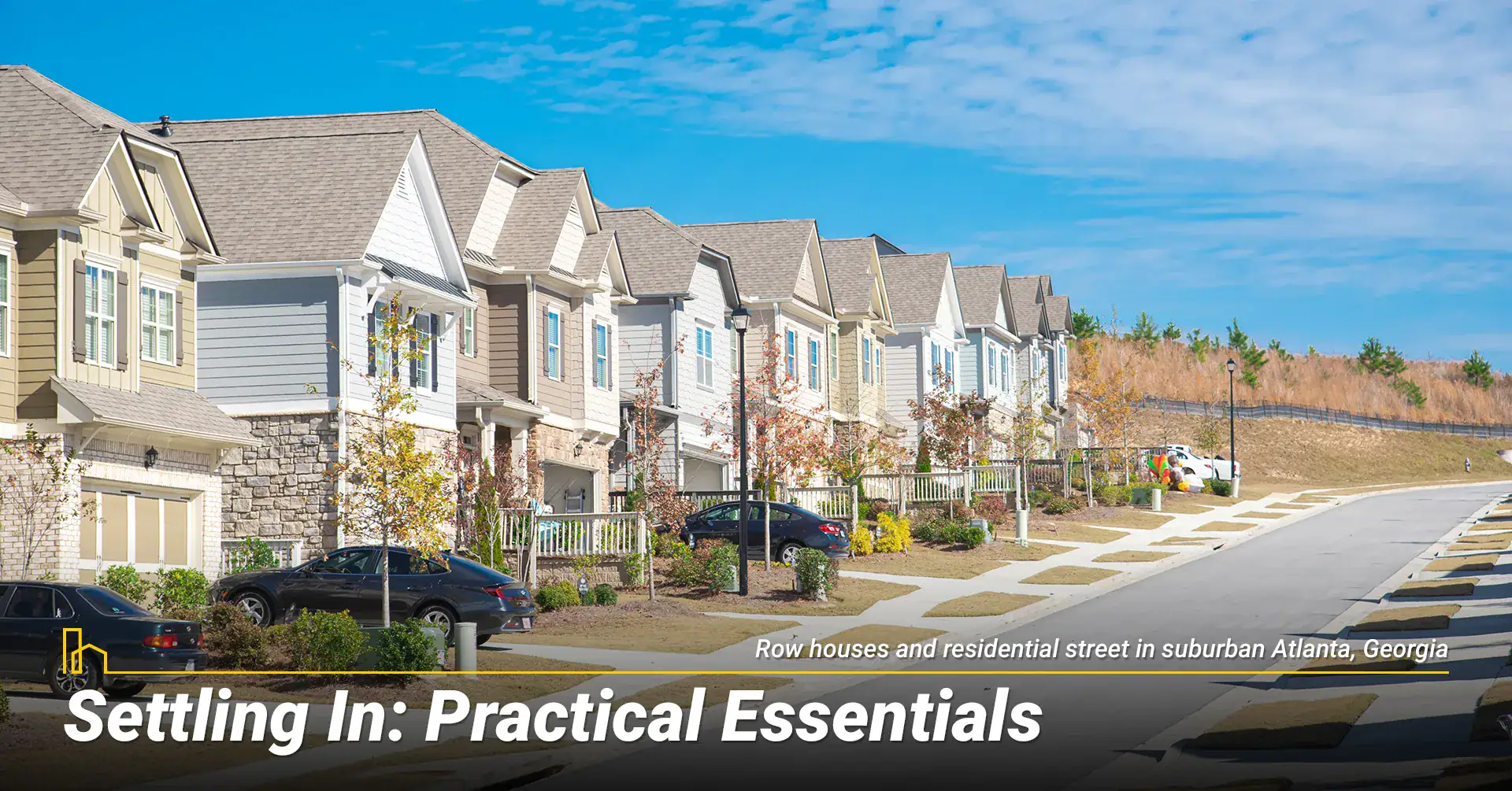
A. Utilities and Services Setup
Georgia utilities are managed by reliable local providers including Georgia Power and local utilities for electricity and natural gas, municipal water systems, and internet options including Comcast, AT&T, and regional providers offering multiple high-speed options statewide.
| Utility/Service | Provider Type | Typical Monthly Cost |
| Electricity | Public/Private (Georgia Power) | $134 |
| Natural Gas | Public/Private | $118 |
| Water/Sewer | Municipal | $28 |
| Internet/Cable | Private providers | $108 |
B. Legal Requirements and Documentation
Georgia requires new residents to register vehicles and obtain driver’s licenses within 30 days of establishing residency. Update addresses with banks, insurance companies, and all service providers immediately upon arrival.
| Requirement | Deadline/Details | Important Notes |
| Vehicle Registration | Within 30 days of residency | Safety inspection required |
| Driver’s License | Within 30 days of residency | Written and road tests may be required |
| Voter Registration | As soon as possible | Can be completed online |
| Address Updates | Immediately upon moving | Notify all service providers |
C. Community Integration and Social Networks
Georgians are genuinely friendly and welcoming to newcomers who show interest in community involvement. Join local clubs, attend neighborhood events, volunteer for community organizations, and participate in seasonal festivals to build lasting friendships and feel at home quickly.
Recommended for you
9. Georgia’s Unique Rules and Requirements
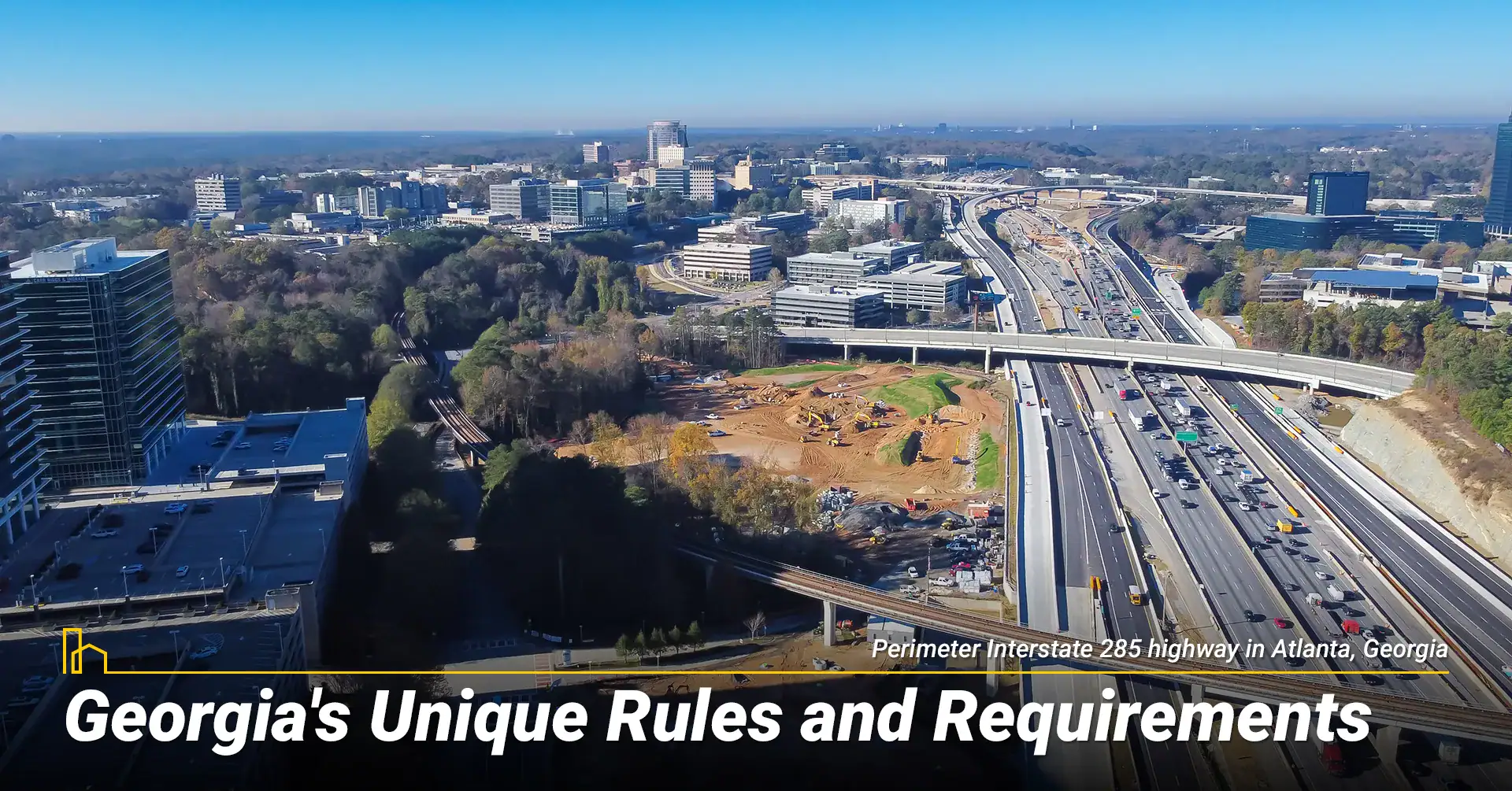
A. Vehicle Registration and Safety Standards
Georgia requires vehicle registration within 30 days of establishing residency. Most vehicles need safety inspections, and certain counties require emissions testing to maintain air quality standards.
B. Residency Establishment and Documentation
You’re considered a Georgia resident after living here more than 6 months (183 days) annually. Establish residency by renting or purchasing property, obtaining Georgia employment, registering to vote, or enrolling children in Georgia schools.
10. Financial Planning and Budget Adjustment
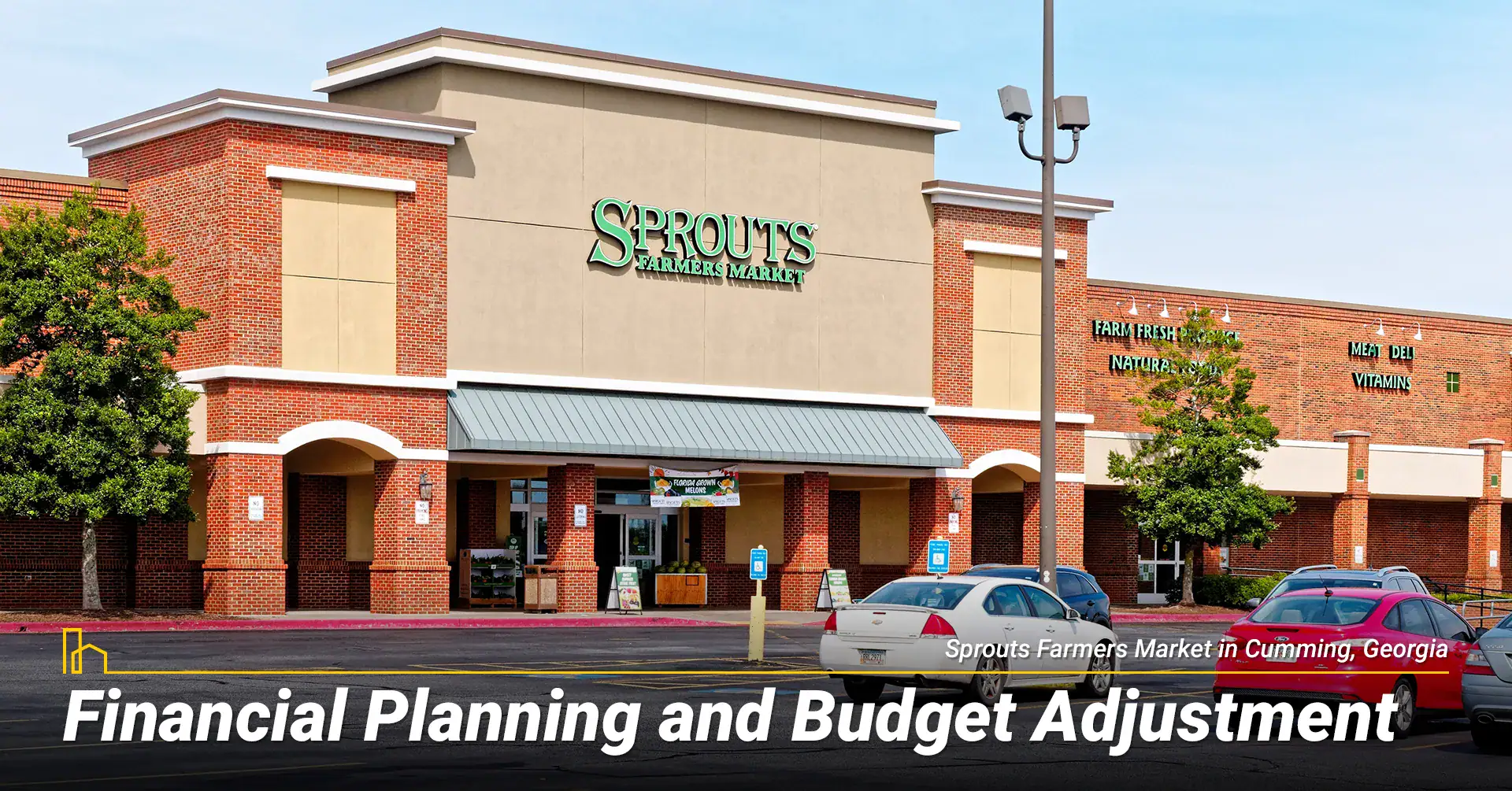
Georgia living costs approximately 5% below national averages, primarily due to affordable housing and utilities. Grocery costs align with national averages, while transportation expenses remain manageable throughout the state.
Creating a Georgia-Adjusted Budget
| Expense Category | Estimated Cost Range |
| Professional Moving Costs | $1,000–$10,000+ |
| Security Deposits | 1–2 months’ rent |
| Utility Setup Fees | $100–$300 |
| Emergency Fund | 3–6 months’ expenses |
An Ultimate Guide to Moving for Home Buyers and Sellers
Buying and selling a home doesn’t make you an expert in moving. Buying and selling are much more different when you’re actually moving. Carefully go through the tips listed below and uses these as your ultimate guide whenever moving…
Insider Tips from a Georgia Local

- Be Prepared for Summer Heat: Georgia summers can be hot and humid. Invest in quality air conditioning and enjoy the beautiful spring and fall seasons.
- Embrace the Seasons: Georgia’s mild climate provides year-round outdoor opportunities, though summers require heat preparation and hydration.
- Explore the Outdoors: Georgia’s parks, lakes, trails, and beaches rank among America’s best. Take advantage of diverse recreational opportunities.
- Get Involved: Join local clubs, volunteer for causes, or attend neighborhood events to make friends and feel at home faster.
- Shop Local: Support farmers markets and local businesses for fresh, delicious food and unique gifts while supporting communities.
Summary: Your Georgia Adventure Awaits
Ready to make the move to the Peach State? Georgia offers an exceptional combination of Southern charm, economic opportunity, and quality of life that creates an unmatched living experience. Whether you’re seeking metropolitan excitement in Atlanta, historic beauty in Savannah, or small-town charm in North Georgia mountains, you’ll find your perfect fit among the welcoming communities.
From world-class schools and thriving job markets to stunning natural landscapes and vibrant cities, Georgia provides opportunities and experiences for everyone. The adjustment to Southern culture and humid summers is quickly balanced by incredible benefits: affordable living, genuine hospitality, rich cultural heritage, and year-round outdoor recreation.
Recommended for you
Frequently Asked Questions About Moving to Georgia
1. Do I Need a Car in Georgia? You can manage without a car in Atlanta and Savannah thanks to public transit, but suburban areas and smaller cities typically require personal vehicles for daily transportation.
2. How Safe Is Georgia Compared to Other States? Georgia is generally safe, especially in suburban and small town communities. Urban neighborhoods vary, so research specific areas before choosing where to live.
3. What Are the Biggest Challenges for Georgia Newcomers? Adjusting to heat and humidity, building new social networks, and understanding Southern customs can be challenging initially. Most newcomers adapt quickly and love Georgia life.
4. How Much Money Should I Budget for Moving to Georgia? Plan $1,000–$10,000+ for professional moving costs depending on distance. Budget for security deposits, utility setup, and emergency funds for unexpected expenses.
5. Is Georgia Really as Family-Friendly as People Say? Absolutely! Georgia neighborhoods are safe, schools are excellent, and countless family activities are available year-round including beaches, mountains, and cultural attractions.
6. What’s the Weather Really Like in Georgia? Georgia features warm, humid summers and mild winters. Spring and fall are brief but beautiful with comfortable temperatures ideal for outdoor activities.
7. What Steps Must I Take After Moving to Georgia? Register your vehicle, obtain a Georgia driver’s license, update your address with all providers, and enroll children in school. Notify banks and insurance companies immediately.
8. What Are the Pros and Cons of Georgia’s Tax Structure? Georgia’s flat income tax and reasonable property taxes are attractive, though overall tax burden is moderate. Most residents find good value for public services.
9. Do Georgians Really Love Their Sports Teams? Yes! Georgia residents are passionate about professional teams including Atlanta Braves, Falcons, and Hawks, plus college athletics with the University of Georgia and Georgia Tech.
10. How Do I Establish Residency in Georgia? You become a Georgia resident after living here more than 6 months annually, or earlier by renting/buying property, obtaining employment, registering to vote, or enrolling children in school.
30 Best Packing Tips for Moving to a New City
How do you get everything safely from Point A to Point B on a tight schedule? With a lot of planning. Here are our best tips to make the process of moving to a new city as smooth as possible…
Table of Contents:
- Why Choose Georgia for Your Next Move?
- 1. What Is It Really Like to Live in Georgia?
- 2. Cost of Living & Affordability in Georgia
- 3. Jobs, Economy, and Career Opportunities
- 4. Education Excellence in Georgia
- 5. Georgia Tax Structure
- 6. Best Places to Live in Georgia
- 7. Planning Your Georgia Move: Step-by-Step Timeline
- 8. Settling In: Practical Essentials
- 9. Georgia’s Unique Rules and Requirements
- 10. Financial Planning and Budget Adjustment
- Insider Tips from a Georgia Local
- Frequently Asked Questions About Moving to Georgia
Brennan is a lifelong resident of the metro Atlanta area, Georgia, with a deep appreciation for the city’s dynamic culture and growth. A software professional by trade, Brennan enjoys channeling his analytical mindset and creative energy into writing. Whether exploring local insights or diving into broader topics, he brings a unique perspective shaped by his professional expertise and personal experiences. Writing is a passion he pursues casually, allowing him to share stories and connect with audiences.
HOMEiA is a city guide site where visitors can find detailed information about communities of interest. HOMEiA’s City Guides, created in partnership with local writers and editors, are curated lists of the best, safest, and most affordable places to live. The guides feature the HOMEiA Score, a proprietary index that rates communities on such factors as housing costs, education, employment, etc.
HOMEiA.com aims to be the premier site for people planning to relocate, providing them with insightful content and connecting them with skilled real estate professionals.
We also empower real estate professionals to establish or strengthen their web presence by highlighting their experience, knowledge and achievements. If you’re selected to join our list of certified real estate professionals, you will distinguish yourself from your peers — and earn HOMEiA’s support.
If you believe in HOMEiA’s mission, please share our website with others.
Table of Contents:
- Why Choose Georgia for Your Next Move?
- 1. What Is It Really Like to Live in Georgia?
- 2. Cost of Living & Affordability in Georgia
- 3. Jobs, Economy, and Career Opportunities
- 4. Education Excellence in Georgia
- 5. Georgia Tax Structure
- 6. Best Places to Live in Georgia
- 7. Planning Your Georgia Move: Step-by-Step Timeline
- 8. Settling In: Practical Essentials
- 9. Georgia’s Unique Rules and Requirements
- 10. Financial Planning and Budget Adjustment
- Insider Tips from a Georgia Local
- Frequently Asked Questions About Moving to Georgia












































































































































